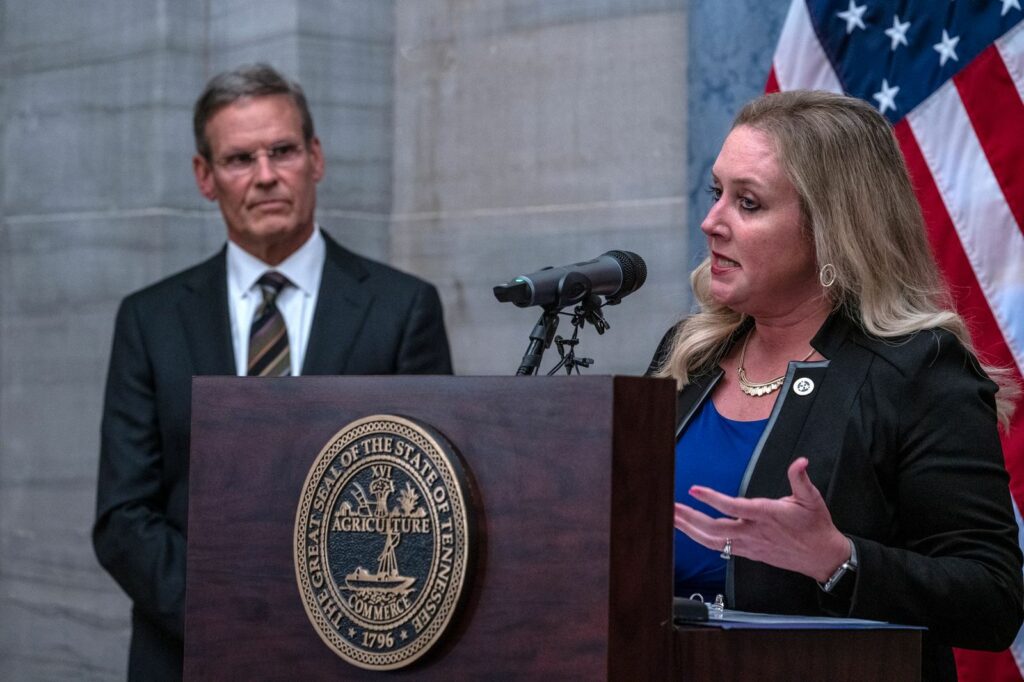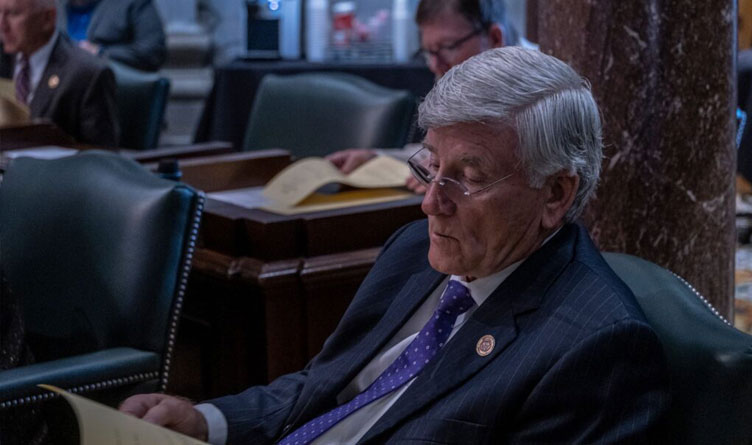Photo: Sen. Todd Gardenhire, R-Chattanooga, is questioning Gov. Bill Lee’s no-bid contracts. Photo Credit: John Partipilo
By Sam Stockard [The Tennessee Lookout CC BY-NC-ND 4.0] –
State lawmakers are taking a tougher stance on sole-source contracts, asking hard questions of state agencies and homing in on deals the state signed with McKinsey & Co.
State Sen. Todd Gardenhire sent Gov. Bill Lee’s deputy and chief counsel, Lang Wiseman, a letter seeking a copy of the contract the state inked with McKinsey & Co. during Lee’s first year in office for a study on streamlining government.
“I understand this did not go through the Fiscal Review Committee because it was a one year contract. We are looking at certain reforms to the Fiscal Review process,” Gardenhire said in the letter.
Chairman of the Fiscal Review Committee, Gardenhire, a Chattanooga Republican, has made it clear he is digging in on no-bid or sole-source contracts.
Of $1.27 billion spent during the first year of the pandemic, 99% of the liability stemmed from non-competitive contracts, according to a state report referenced by Gardenhire in the October Fiscal Review Committee meeting.
“Y’all might notice that’s why we keep talking about these sole-source contracts, asking different agencies to come and explain why (we) sole-source. We just want to make sure everything is on the up and up and we understand why there’s no competitive bids,” Gardenhire said.
Rep. Patsy Hazlewood, a Signal Mountain Republican, further encouraged state departments and agencies to look for other options when sole-source contracts expire, even if it appears no other vendor provides the service.
“Because sometimes it seems people or vendors perhaps could have us over a barrel in these kinds of situations,” said Hazlewood, who chairs the House Finance, Ways and Means Committee.
**** CLICK HERE to support Conservative Journalism in Tennessee. We bring you stories like this without your support!
Tennessee signed a second contract with McKinsey & Co. even though Attorney General Herbert Slatery’s office was investigating McKinsey’s role in consulting with opioid manufacturers on the marketing and profiting of drug sales, including Oxycontin maker Purdue Pharma. Asked about the contract more than a year ago, Gov. Bill Lee said he wasn’t aware McKinsey was part of the opioid investigation.
The Fiscal Review Committee discussed the possibility of having the Comptroller’s Office conduct random audits on no-bid contracts, a move Hazlewood endorsed.
Gardenhire, in fact, is still trying to obtain the original report made by McKinsey & Co. after Tennessee signed a $9 million contract with the company for the government efficiency study, which concluded in 2020.
The state entered yet another one-year $3 million contract in March 2020 with McKinsey & Co. to handle the state’s COVID-19 response. It was extended for another $798,000 as the pandemic continued, a state contract shows.
The state inked that second contract with McKinsey even though the Attorney General’s Office was investigating McKinsey’s role in consulting with opioid manufacturers on the marketing and profit of drug sales, mainly Purdue Pharma.
Tennessee received some $15.2 million in a settlement between McKinsey & Co. and 54 states and territories, according to reports, as part of the state’s probe into the opioid epidemic.
Asked about the McKinsey contract more than a year ago, Lee said he didn’t realize McKinsey was being investigated as part of the opioid problem.
Still, he has defended no-bid contracts made during the pandemic, saying decisions had to be made rapidly to provide personal protective equipment and COVID-19 tests to businesses and the public.
During the early months of the pandemic, lawmakers questioned $80 million in no-bid spending by the Governor’s Office, mainly through his Unified Command Group, including $8.3 million for 5 million sock masks from Renfro Corp. and $6.8 million for a sole-source deal with Pale Horse GRS in which the state paid $2.55 per N-95 mask while paying another vendor 54 cents for each mask.

Gardenhire and other legislators have also challenged a $26 million contract with Utah-based Nomi Health, which sent COVID-19 test kits and personal protective equipment considered questionable, specifically the accuracy of Nomi Health tests and the likelihood they would show incorrect negative test results, even before the state signed the contract April 30, 2020.
That led to the state terminating the contract and paying only $6 million.
According to a letter from Health Commissioner Lisa Piercey, the Department of Health completed its review of the Nomi contract, obtaining additional documents from the vendor to confirm the state received the correct number of tests. In addition, Piercey said test collection kits that had been stored at the state’s public health lab are being distributed for use in the field.
Health Department officials have defended their efforts, saying they were at the mercy of vendors who often told them they would drop their offer and go to other states to sell personal protective equipment and COVID-19 test kits.
I would hate to see us get into a situation where that data’s compromised or there’s malfeasance and we have no control over that because they have a functional monopoly. – Sen. Heidi Campbell, D-Nashville, on no-bid contracts
In the October Fiscal Review Committee, lawmakers asked numerou questions about no-bid deals, including a contract between TennCare and National Research Corp., which surveys nursing homes to determine their quality of care. Legislators wanted to see the data to ensure the state is getting its money’s worth on the contract.
The committee approved a one-year extension of a contract between the Department of Transportation and Bentley for an engineering software program used for road construction. TDOT officials explained it is the “bell cow” for road projects, used by 49 of 50 states and that switching to a new vendor would be expensive.
Sen. Heidi Campbell, a Nashville Democrat, has been challenging state expenditures and contracts since the pandemic started.
She raised the question of whether sole-source software contracts could be audited, especially in cases where a vendor works with 50 states on the same program.
“I would hate to see us get into a situation where that data’s compromised or there’s malfeasance and we have no control over that because they have functionally a monopoly,” Campbell said.
Yet other lawmakers contend the state drives down competition and innovation when it consistently signs sole-source contracts with the same vendor because it claims no other company provides the same service.

Sam Stockard is a veteran Tennessee reporter and editor, having written for the Daily News Journal in Murfreesboro, where he served as lead editor when the paper won an award for being the state’s best Sunday newspaper two years in a row. He has led the Capitol Hill bureau for The Daily Memphian. His awards include Best Single Editorial from the Tennessee Press Association. You can contact Stockard at sstockard@tennesseelookout.com.





2 Responses
These situations arise because unelected people are given too much power. Actually some of the elected officials don’t seem immune to misusing their power. No-bid contracts have been the bane of every state, municipality and village everywhere. The only reason to allow a no-bid contract is if it’s proven no one else can do what’s required. I know it take time and effort to do it right, but legislators owe it to the taxpayers to take that time and effort to insure our money is well spent.
As a procurement fraud specialist investigator with NCIS for 20 years sole-source contracts were always a target for review. Generally found government laziness or failure to properly plan were causes. Fraud? Yes! That too.